


xxxxxThe Irish playwright and critic George Bernard Shaw was one of the finest and most controversial dramatists of the 20th century. Having failed as a novelist, he began writing for the stage, and gained his first notable success in 1894 with his play Arms and the Man, a cynical appraisal of war. After this his major stage productions included Man and Superman (1903), Major Barbara (1905), his comic masterpiece Pygmalion (1913), and Heartbreak House (1920). His St. Joan, staged in 1923, earned him the Noble Prize for Literature two years later, and brought him to the height of his international fame. Discarding the artificial melodrama of the Victorian stage, Shaw used his plays - he wrote over 50 - to air his views on the serious social, political and religious questions of his time. The stage became an arena for debate and a platform for reform. At the same time he enthralled his audience with the comic situations he created and his sparkling witty dialogue. Like his compatriot Oscar Wilde, he used comedy to highlight the failings of society. In addition, he was also a brilliant drama, art and music critic, and a skilful public speaker in support of his socialist beliefs. And quite apart from his incisive wit, the long prefaces which accompanied his plays showed his mastery of English prose. By his original ideas and his impish humour, he was seldom out of the public eye.
GEORGE BERNARD SHAW 1856 - 1950
(Va, Vb, Vc, E7, G5, G6)
Acknowledgements
Shaw: by the London-based photographic company Elliot & Fry (active 1863-1962), 1919. Caricature: by the English illustrator Bernard Partridge (1861-1945), c1925. Shed: date and photographer unknown. Pinero: produced and published by the Bain News Service, a New York photographic company created in 1898 – the George Grantham Bain Collection, Prints and Photographs Division, Library of Congress, Washington.
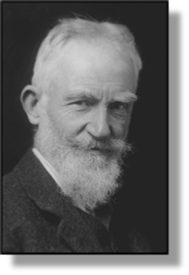 xxxxxThe Irish critic and dramatist George Bernard Shaw, a leader of the realist movement in the theatre, gained some prominence as a playwright with his Widowers’ Houses, produced privately in 1892, but it was his Arms and the Man, a cynical appraisal of war, that brought him a measure of public acclaim in 1894, and started him off on his successful career. Among his major stage productions were the Devil’s Disciple (1897), Man and Superman (1903), Major Barbara (1905), Pygmalion (1913), Heartbreak House (1920), and St. Joan (1923). He was awarded the Nobel Prize for Literature in 1925.
xxxxxThe Irish critic and dramatist George Bernard Shaw, a leader of the realist movement in the theatre, gained some prominence as a playwright with his Widowers’ Houses, produced privately in 1892, but it was his Arms and the Man, a cynical appraisal of war, that brought him a measure of public acclaim in 1894, and started him off on his successful career. Among his major stage productions were the Devil’s Disciple (1897), Man and Superman (1903), Major Barbara (1905), Pygmalion (1913), Heartbreak House (1920), and St. Joan (1923). He was awarded the Nobel Prize for Literature in 1925.
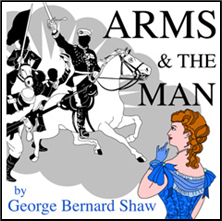 xxxxxShaw was born in Dublin, and grew up in what has been termed “genteel poverty”. He attended both Protestant and Catholic day schools in the city, but he was not particularly interested in his classes and sought, as he put it, “refuge in idleness”. However, having left school at the age of 15, and started work in the office of a local estate agent, he spent his spare time studying the subjects that did interest him - literature, music and painting. He was helped in this by his mother, a music teacher, and by frequent visits to the National Gallery of Ireland. Then fate took a hand. When his parents’ marriage failed in 1872, and his mother and sisters went to live in London, he joined them in 1876. It was then - after long hours spent in public libraries and the British Museum - that he began his career as a music, art and drama critic, writing for a number of London periodicals. It was a profession in which he quickly gained a lively reputation, particularly for his columns in the Saturday Review. By the end of the century, he had came to be regarded as the best critic of his generation.
xxxxxShaw was born in Dublin, and grew up in what has been termed “genteel poverty”. He attended both Protestant and Catholic day schools in the city, but he was not particularly interested in his classes and sought, as he put it, “refuge in idleness”. However, having left school at the age of 15, and started work in the office of a local estate agent, he spent his spare time studying the subjects that did interest him - literature, music and painting. He was helped in this by his mother, a music teacher, and by frequent visits to the National Gallery of Ireland. Then fate took a hand. When his parents’ marriage failed in 1872, and his mother and sisters went to live in London, he joined them in 1876. It was then - after long hours spent in public libraries and the British Museum - that he began his career as a music, art and drama critic, writing for a number of London periodicals. It was a profession in which he quickly gained a lively reputation, particularly for his columns in the Saturday Review. By the end of the century, he had came to be regarded as the best critic of his generation.
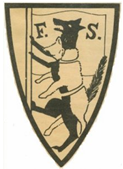 xxxxxBut his success as a critic was not mirrored in his aspirations to become a budding author. Dozens of his articles were rejected, and none of his five novels, written between 1879 and 1883, (such as The Irrational Knot and Love among the Artists) found favour with any of the London publishing houses. But a new outlet for his talent came in the mid-1880s. Havingxput his mind to the works of the communist theorist Karl Marx, in 1884 he became a leading member of the newly-formed Fabian Society, a group that aimed, by gradual and peaceful means, to win over the British government and society in general to the doctrine of socialism. In this organisation he became quickly known for his skill as a witty and persuasive orator, and in 1889 he edited its defining tract, Fabian Essays in Socialism. And it was through the Fabian Society that he met the Irish heiress Charlotte Payne-Townshend, whom he married in 1898.
xxxxxBut his success as a critic was not mirrored in his aspirations to become a budding author. Dozens of his articles were rejected, and none of his five novels, written between 1879 and 1883, (such as The Irrational Knot and Love among the Artists) found favour with any of the London publishing houses. But a new outlet for his talent came in the mid-1880s. Havingxput his mind to the works of the communist theorist Karl Marx, in 1884 he became a leading member of the newly-formed Fabian Society, a group that aimed, by gradual and peaceful means, to win over the British government and society in general to the doctrine of socialism. In this organisation he became quickly known for his skill as a witty and persuasive orator, and in 1889 he edited its defining tract, Fabian Essays in Socialism. And it was through the Fabian Society that he met the Irish heiress Charlotte Payne-Townshend, whom he married in 1898.
xxxxxBut if success escaped him as a novelist, it did not do so for very long when he turned his hand to writing for the stage. In the beginning, all but one of his first seven plays (later published as Plays Pleasant and Unpleasant), made little impact. Indeed, his Widowers’ Houses, attacking slum landlords, was considered too radical, and Mrs Warren’s Profession, dealing as it did with organized prostitution, was banned as obscene. One play, however, Arms and the Man, a work in which he satirized the romantic conceptions of love and war, proved a commercial success, and marked - albeit tentatively - the beginning of his career as a playwright. It was a career that was to make him one of the finest and most controversial dramatists of the 20th century, considered by many as important as William Shakespeare himself - who, incidentally, Shaw roundly criticised for failing to give a “message” for his age.
Vc-1881-1901-Vc-1881-1901-Vc-1881-1901-Vc-1881-1901-Vc-1881-1901-Vc-1881-1901-Vc
Including:
Arthur Wing Pinero

xxxxxShaw wrote over 50 plays and, as an ardent critic of society, he used the majority of them to propound his views on the serious social, political and religious questions of his time. His comedies, it has been rightly said, were half-sermons, but whilst they were intended to make an impact upon the social conscience as well as the emotions of his audience, they also delighted and enthralled that same audience by their sparkling, witty dialogue. Like his contemporary and fellow countryman, Oscar Wilde, he put comedy to good didactic use, ensuring thereby that his plays maintained their popular appeal. As one American critic succinctly put it, he created mirth as well as thought. And at the same time, he reinforced his own theories - provocative and usually original - by providing long prefaces to his works. Written in a fluent, rich prose, they analysed in depth questions related to a variety of subjects, such as the validity of family and marriage, political and educational reform, health care, poverty, class divisions and female emancipation - often having no bearing whatsoever upon the drama about to unfold! By the early years of the 20th century Shaw was a well-established international playwright, particularly popular in Germany and the United States, where many of his works were first performed.
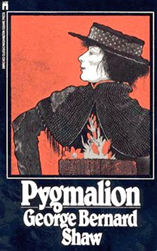
xxxxxIn what has been termed his “theatre of ideas”, his wide variety of themes and theories are aired and explored in all his major works. In Man and Superman, produced in 1903 and today regarded as one of his best plays, he explains Creative Evolution, his own religious concept wherein woman is the biological “Life Force” striving to produce a superior being, whilst Major Barbara, written two years later, dwells mainly upon the ills of poverty and capitalism. The Doctor’s Dilemma of 1906 takes an amusing but sceptical look at the medical profession, and his masterpiece, the romantic comedy Pygmalion, staged in 1913, is a highly humorous but nonetheless sharp attack upon the rigid class system endemic within British society. Among Shaw’s other stage productions around this time, mention must be made of Candida, produced in 1897, and his plays Caesar and Cleopatra, John Bull’s Other Island (concerned with the vexed Anglo-Irish question) and Androcles and the Lion, a clever satire on Christianity.
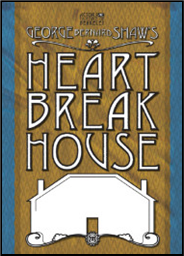
xxxxxThe coming of the First World War - an event which Shaw claimed could and should have been avoided by negotiation - had a marked impact upon his writings. One of his most accomplished productions, Heartbreak House, written in 1919, feared for the future of the world because of man’s spiritual bankruptcy, and this pessimism was continued the following year in his fantasy Back to Methuselah, a series of five linked plays in which he returned to the idea of the Creative Evolution. There was, as he saw it, a pressing need for man to live longer because the knowledge required for a person to govern society properly could not achieved within the space of the present human life-span.
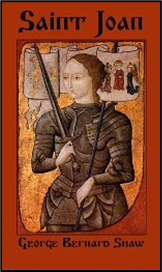 xxxxxFollowing his production of his masterpiece Saint Joan in 1923 - prompted by the canonization of Joan of Arc in 1920 - Shaw was awarded the Nobel Prize for his contribution to literature. After this, although he continued writing until his death at 94, none of his works enjoyed the same measure of success, and a number of them turned to extravaganza, as in Too True To Be Good. Notable, however, was his futuristic comedy The Apple Cart of 1929, and his Geneva of 1936, written as, once again, war loomed on the horizon. His non-fiction work The Intelligent Woman’s Guide to Socialism and Capitalism, and his tale The Adventures of the Black Girl in Her Search for God, four years later, set out his thoughts and theories on politics and religion at that time. And to the end Shaw continued to write brilliant essays, and to bombard publishers with thought-provoking letters and articles. And as a critic - be it a book review or his art and music critiques - his views were trenchantly written and void of any kind of academic jargon. It was via these columns - and other learned works - that he championed the controversial work of the German composer Richard Wagner, and promoted the realistic dramas of the Norwegian playwright Henrik Ibsen.
xxxxxFollowing his production of his masterpiece Saint Joan in 1923 - prompted by the canonization of Joan of Arc in 1920 - Shaw was awarded the Nobel Prize for his contribution to literature. After this, although he continued writing until his death at 94, none of his works enjoyed the same measure of success, and a number of them turned to extravaganza, as in Too True To Be Good. Notable, however, was his futuristic comedy The Apple Cart of 1929, and his Geneva of 1936, written as, once again, war loomed on the horizon. His non-fiction work The Intelligent Woman’s Guide to Socialism and Capitalism, and his tale The Adventures of the Black Girl in Her Search for God, four years later, set out his thoughts and theories on politics and religion at that time. And to the end Shaw continued to write brilliant essays, and to bombard publishers with thought-provoking letters and articles. And as a critic - be it a book review or his art and music critiques - his views were trenchantly written and void of any kind of academic jargon. It was via these columns - and other learned works - that he championed the controversial work of the German composer Richard Wagner, and promoted the realistic dramas of the Norwegian playwright Henrik Ibsen.
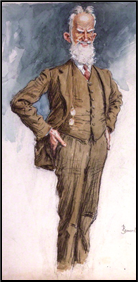 xxxxxShaw died in his country home in Hertfordshire in November 1950. As an original and provocative thinker, his plays - intellectual in content but lightened considerably by comic situation and an incisive wit - questioned many of the accepted ideas of his day, and made his audience, and those to come, take a new look at social, political and religious matters. In short, he turned the Victorian stage - then awash with artificial melodramas - into an arena for debate and a platform for reform. But Shaw is not only remembered for his outstanding contribution to the stage. Quite apart from being a radical socialist and social reformer, he was also a brilliant critic, essayist and pubic speaker, and a master of English prose. And as a showman - irreverent and controversial most of the time, impudent and impish some of the time - he was seldom out of the public eye.
xxxxxShaw died in his country home in Hertfordshire in November 1950. As an original and provocative thinker, his plays - intellectual in content but lightened considerably by comic situation and an incisive wit - questioned many of the accepted ideas of his day, and made his audience, and those to come, take a new look at social, political and religious matters. In short, he turned the Victorian stage - then awash with artificial melodramas - into an arena for debate and a platform for reform. But Shaw is not only remembered for his outstanding contribution to the stage. Quite apart from being a radical socialist and social reformer, he was also a brilliant critic, essayist and pubic speaker, and a master of English prose. And as a showman - irreverent and controversial most of the time, impudent and impish some of the time - he was seldom out of the public eye.
xxxxxIncidentally,xfrom 1887 to 1906 Shaw served as a councillor on St. Pancras Borough Council, dealing with matters such as street lighting, drainage and health care. And, as a member of the Fabian Society, he worked closely with its founders, the social reformers Sidney (1859-1947) and Beatrice Webb (1858-1943). Together they founded the London School of Economics and Political Science in 1895, and helped in forming the Labour Representation Committee in 1900, the forerunner of the Labour Party in 1906. The Webbs went on to write The History of Trade Unions in 1894 and Industrial Democracy three years later, and they were responsible for founding the left-wing political magazine The New Statesman in 1913. ……
xxxxx…… Shaw numbered among his friends the English composer Edward Elgar and the Welsh writer Thomas Edward Lawrence (1888-1935), the soldier who became known as Lawrence of Arabia during the First World War. He also knew the English author H.G. Wells, but, as we shall see, their friendship came to an abrupt end when, having joined the Fabian Society, Wells attempted to take over its control. …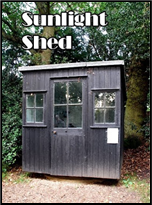 …
…
xxxxx…… Shaw’s ashes were mixed with those of his wife and scattered along the footpaths and around the statue of St. Joan in the garden of their home at Ayot St. Lawrence, a small village in Hertfordshire. Now known as “Shaw’s Corner”, they lived there from 1906. It was there, at the bottom of the garden, that Shaw built his little revolving hut (illustrated), the hide-away where he wrote many of his major works, including Pygmalion. He called it “London” so that an unwelcome visitor could be told that he was away working in the capital! ......
xxxxx…… Major Barbara was made into a motion picture in 1941, and Pygmalion a film in 1938, a musical, My Fair Lady, in 1956, and a revised film of that name in 1964. He won an Oscar for his screenplay version of Pygmalion in 1938, thereby becoming the only person to have won both an Oscar and a Nobel Prize. When the Labour Party came to power in 1924 he was offered a peerage and the Order of Merit. He declined both with the characteristic comment that he did not wish to sit in the House of Lords, and he had already conferred the Order of Merit upon himself. Apparently he also declined the Nobel Prize in 1925, but was persuaded by his wife to accept it in honour of Ireland.
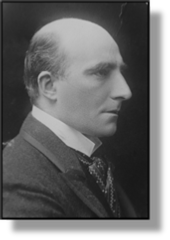
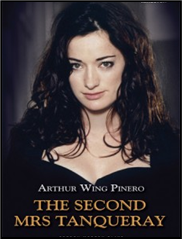 xxxxxA contemporary playwright when George Bernard Shaw began writing for the stage was the Londoner Arthur Wing Pinero (1855-1934). He became an actor at the age of 19, but began writing plays in the late 1870s. Despite some attempt to develop realist drama, his plots and characters remained somewhat conventional. Shaw dismissed him as “a humble and somewhat belated follower of the novelists of the mid-19th century”. Nevertheless his farces, particularly The Magistrate of 1885, and Dandy Dick two years later, proved highly popular, and his tragedies did help to pave the way for “social drama”. Today he is mainly remembered for his problem play of 1893 entitled The Second Mrs Tanqueray, the story of a “woman with a past” who attempts to make herself respectable. Among his plays staged in the 1880s were The Schoolmistress and Sweet Lavender, and, in the 1890s, The Notorious Mrs Ebbsmith, Trewlawny of the Wells, and The Gay Lord Quex.
xxxxxA contemporary playwright when George Bernard Shaw began writing for the stage was the Londoner Arthur Wing Pinero (1855-1934). He became an actor at the age of 19, but began writing plays in the late 1870s. Despite some attempt to develop realist drama, his plots and characters remained somewhat conventional. Shaw dismissed him as “a humble and somewhat belated follower of the novelists of the mid-19th century”. Nevertheless his farces, particularly The Magistrate of 1885, and Dandy Dick two years later, proved highly popular, and his tragedies did help to pave the way for “social drama”. Today he is mainly remembered for his problem play of 1893 entitled The Second Mrs Tanqueray, the story of a “woman with a past” who attempts to make herself respectable. Among his plays staged in the 1880s were The Schoolmistress and Sweet Lavender, and, in the 1890s, The Notorious Mrs Ebbsmith, Trewlawny of the Wells, and The Gay Lord Quex.







 xxxxxThe Irish critic and dramatist George Bernard Shaw, a leader of the realist movement in the theatre, gained some prominence as a playwright with his Widowers’ Houses, produced privately in 1892, but it was his Arms and the Man, a cynical appraisal of war, that brought him a measure of public acclaim in 1894, and started him off on his successful career. Among his major stage productions were the Devil’s Disciple (1897), Man and Superman (1903), Major Barbara (1905), Pygmalion (1913), Heartbreak House (1920), and St. Joan (1923). He was awarded the Nobel Prize for Literature in 1925.
xxxxxThe Irish critic and dramatist George Bernard Shaw, a leader of the realist movement in the theatre, gained some prominence as a playwright with his Widowers’ Houses, produced privately in 1892, but it was his Arms and the Man, a cynical appraisal of war, that brought him a measure of public acclaim in 1894, and started him off on his successful career. Among his major stage productions were the Devil’s Disciple (1897), Man and Superman (1903), Major Barbara (1905), Pygmalion (1913), Heartbreak House (1920), and St. Joan (1923). He was awarded the Nobel Prize for Literature in 1925.  xxxxxShaw was born in Dublin, and grew up in what has been termed “genteel poverty”. He attended both Protestant and Catholic day schools in the city, but he was not particularly interested in his classes and sought, as he put it, “refuge in idleness”. However, having left school at the age of 15, and started work in the office of a local estate agent, he spent his spare time studying the subjects that did interest him -
xxxxxShaw was born in Dublin, and grew up in what has been termed “genteel poverty”. He attended both Protestant and Catholic day schools in the city, but he was not particularly interested in his classes and sought, as he put it, “refuge in idleness”. However, having left school at the age of 15, and started work in the office of a local estate agent, he spent his spare time studying the subjects that did interest him - xxxxxBut his success as a critic was not mirrored in his aspirations to become a budding author. Dozens of his articles were rejected, and none of his five novels, written between 1879 and 1883, (such as The Irrational Knot and Love among the Artists) found favour with any of the London publishing houses. But a new outlet for his talent came in the mid-
xxxxxBut his success as a critic was not mirrored in his aspirations to become a budding author. Dozens of his articles were rejected, and none of his five novels, written between 1879 and 1883, (such as The Irrational Knot and Love among the Artists) found favour with any of the London publishing houses. But a new outlet for his talent came in the mid-


 xxxxxFollowing his production of his masterpiece Saint Joan in 1923 -
xxxxxFollowing his production of his masterpiece Saint Joan in 1923 - xxxxxShaw died in his country home in Hertfordshire in November 1950. As an original and provocative thinker, his plays -
xxxxxShaw died in his country home in Hertfordshire in November 1950. As an original and provocative thinker, his plays - …
…
 xxxxxA contemporary playwright when George Bernard Shaw began writing for the stage was the Londoner Arthur Wing Pinero (1855-
xxxxxA contemporary playwright when George Bernard Shaw began writing for the stage was the Londoner Arthur Wing Pinero (1855-


